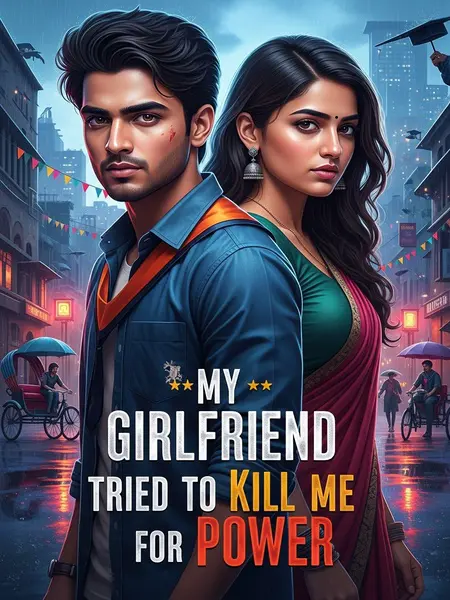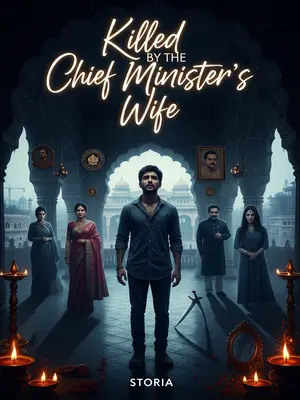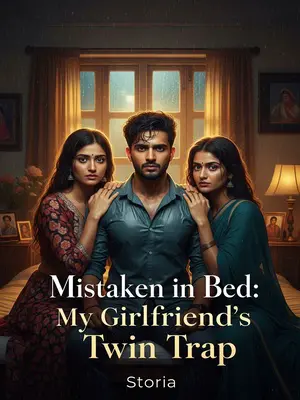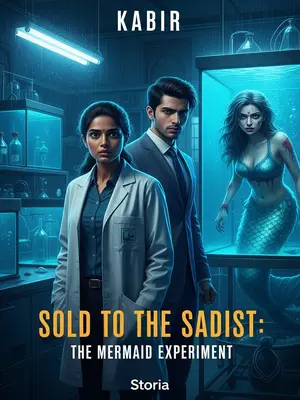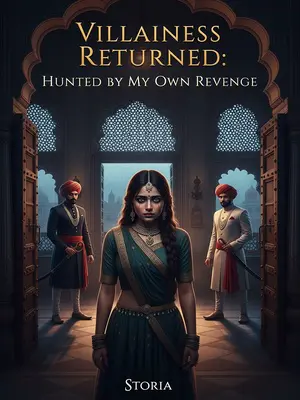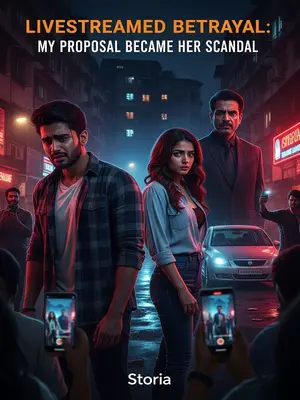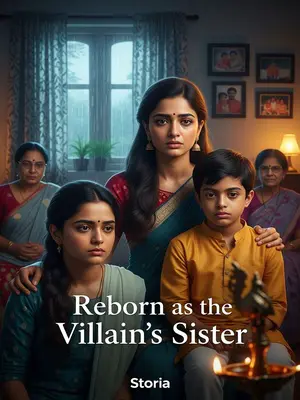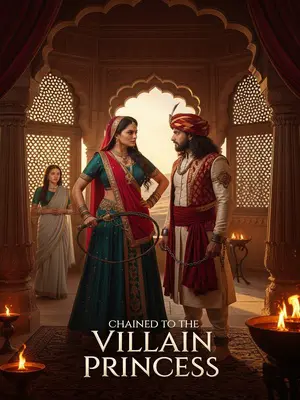Chapter 1: The Interview Begins
I cracked open my eyes and gave them a grin wide enough to make Amma scold me for showing all my teeth.
As the dim, yellowish tube light above us flickered like it might give up at any second, my smile grew even wider. The two youngsters in front of me—one in a crumpled formal shirt, the other clutching a blue folder so tight his knuckles had gone white—looked like they'd accidentally walked into the wrong interview room at a sarkari office. The one at the back, Kabir, suddenly jolted and tried to yank the heavy metal door open. Kabir’s palm left a sweaty print on the rusted handle, his breath quickening like he’d just run up the stairs to catch the last local. But no matter how hard he pulled, the door—freshly closed with a deep clang—refused to budge. Somewhere down the corridor, the chaiwala's cycle bell rang faintly, but inside this room, it was just us and the faint whir of the ceiling fan mixed with the sharp tang of old masalas and stale tea leaves, grounding us in the sort of sarkari basement every city seems to have.
Seeing all this, I let out a low chuckle, the sound echoing off the peeling walls. “Arrey yaar, relax na, why so tense? This is not some UPSC viva, hai na? If I really wanted to do something, even this place couldn’t hold me. So, why don’t you introduce yourselves?” I stretched my legs out, feeling the cool concrete under my bare feet, and gestured lazily the way elders do when they have all the time in the world.
The two exchanged glances—those quick, sidelong looks only new recruits give each other, when both are equally terrified but too stubborn to admit it. After a moment’s hesitation, the taller one with a mop of unkempt hair shuffled forward, his voice cracking just a little as he spoke up. “My name is Rohan.” He cleared his throat and fiddled with the blue folder, as if hoping it would shield him from my stare.
Kabir, the same chap who’d just tried to make a run for it, saw his friend take the plunge and followed suit, trying to steady his voice. “I’m Kabir.”
I nodded, saying nothing more. I let the silence stretch, just a beat longer than comfortable. Kabir’s foot tapped out a nervous rhythm on the cracked tiles, and somewhere outside, the chaiwala’s bell rang again. It’s a trick old hands use: let them stew in their own nerves.
Both of them swallowed nervously, glancing at each other like they were silently debating whether to keep talking or bolt again. Finally, Rohan forced himself to speak: “We’re here today to interview you.” His tone wavered just enough to betray his nerves, but I had to respect the boy’s courage.
I gave a small nod, then settled into the chair behind me. At some point, the iron chair beneath me creaked and, without anyone noticing, felt as solid and comforting as the old wooden ones from my nani’s verandah.
I gestured for them to sit as well, nodding at the two worn-out stools someone had dragged in for visitors. Only then did I really look them over—taking in the newness of their uniforms, the nervous tapping of Kabir’s foot—and asked, “So, what do you want to know?” My voice softened, as if we were about to share secrets over a cup of chai.
After a pause, Rohan cautiously ventured, “They say you’re the strongest ability user—the Demon King who nearly destroyed the world?” His voice, though hesitant, carried that unmistakable bureaucratic curiosity you find in government offices when someone senses an untold story.
I smiled and shook my head. “Strongest ability user? For now, maybe. But there’s one thing they got wrong: I never ‘almost’ destroyed the world.” I watched their eyes widen, the way you do when someone tells you your favourite ghost story just got real.
They both let out a tiny sigh of relief—only for me to continue, drawing out the moment just enough to see their faces freeze again. “I actually did destroy the world. Once.” The words echoed, heavy as the last toll of the temple bell before midnight.
I looked at the two of them, now frozen in shock, and asked, “You’re probably wondering: if I destroyed the world, how are you both still here?” I paused, letting the faint hum of the ceiling fan fill the silence, a sound as familiar as any lullaby in an Indian summer.
Without waiting for a response, I continued, “It’s simple. After I destroyed the world, I restored it. That’s why we can all sit here and chat today.” I let a wry smile escape me, as if it were the most ordinary thing to say.
Rohan swallowed hard, his Adam’s apple bobbing. “I… I don’t quite understand what you mean.” His hands clutched the edge of his folder, knuckles white.
I glanced at him, my eyes crinkling with a trace of amusement. “Then let me start from the beginning.” I shifted in my seat, settling into storyteller mode—the way a dadi or nana would before a long story on a rainy evening.
“Twenty years ago, a mysterious meteorite landed near Pune. A week later, people across India started awakening all sorts of abilities. At first, everyone was sceptical. But soon they discovered that when you turned eighteen, you had a one-in-a-thousand chance of awakening a random ability. Those under eighteen could also awaken their powers on their eighteenth birthday.”
I began to recount my story in the quiet room, the hum of a ceiling fan above us. The faint aroma of old masalas and metal—left over from years of lunch dabbas being opened in this bureau—clung to the air.
“The year after the meteorite landed, I turned eighteen. On my birthday, I felt something stirring in my mind, like an ability about to awaken. But by the end of the day, nothing happened. I thought maybe my ability just needed more time, that it would show up in a few days. But even after starting college in Lucknow, I still hadn’t awakened anything.” The memory of that long, sticky monsoon, when the city’s drains overflowed and the hostel’s power cut out every other night, felt as vivid as ever.
“So, I accepted that I was just an ordinary person and started living an ordinary life—going to college, planning for a decent job after graduation, living like everyone else.” I remembered the smell of chai at the nukkad tea stall, the sound of friends arguing over cricket matches in the corridor, and the distant calls of the sabziwala.
“During college, I had a girlfriend. She treated me well, took care of me, and was always sweet. I fell for her quickly. Back then, she was my whole world—her laughter still rings in my ears like the old Bollywood songs we used to play on my battered phone. Oh, right—her name was Meera.” I let her name linger in the air, as if it still echoed in the alleys of my youth.
‘What? Lady Meera?’ Kabir, who had been silent, suddenly blurted out, eyes wide as if he’d heard a filmi twist.
I looked at him and nodded, a knowing smile touching my lips. “That’s right. The ace of your Seventh Bureau, the so-called Goddess of Vengeance—Meera. That was about ten years ago. Whether she’s still alive, I don’t know.” I shrugged, a bit of sadness flickering across my face, quickly masked by a lazy grin.
I went on, “We spent blissful days together in college, even planned to get married after graduation. But in the end, I wasn’t just an ordinary person. On the day I graduated, my ability finally awakened—though it was late. And in that instant, I saw right through Meera’s ability. Turns out, she’d been hiding it from me all along—she was an ability user too.” The room seemed to grow colder, as if the past had reached out to touch the present.
“So, what exactly is your ability?” Rohan asked, his voice cautious, betraying both awe and a little fear, as though he were asking a baba about some forbidden mantra.
I looked at Rohan and grinned, teeth gleaming like a street dog who’s stolen a hot samosa. “You’re pretty bold. Back then, even your director Uncle Anil—that old fox—tried every trick and still couldn’t figure out my ability, and you think you can get it just by asking?” I raised an eyebrow in mock challenge, the way your favourite chacha does when teasing the neighbourhood kids.
“I didn’t mean it that way—” Rohan tensed up immediately, clearly worried I’d be offended and crush him on the spot. His hand instinctively reached for the tiny rudraksha on his wrist, maybe hoping for a bit of extra protection.
I waved it off, letting out a small laugh that echoed off the peeling walls. “But I’ve been bored for ages, and it’s rare to have someone to chat with. So, I might as well tell you.”
Seeing their eyes light up, I continued, “On graduation day, I finally understood my ability: I can read any power like a schoolbook and change one letter, the way a clever student tweaks answers during an exam.”
Looking at the two, who were clearly struggling to process this, I said, “You don’t quite get it, do you? Let me use you two as examples.”
